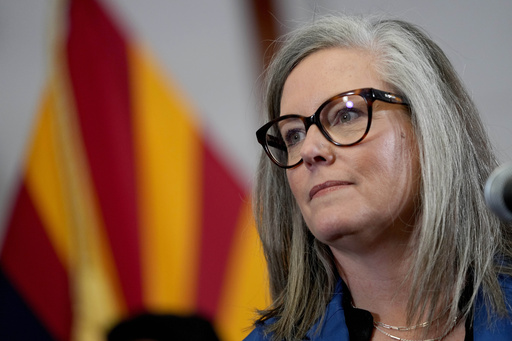Arizona Governor Katie Hobbs is advocating for the repeal of a state law that mandates the submission of an annual abortion report, arguing that such a requirement encroaches on the privacy of patients. This perspective aligns with the efforts of other Democratic officials who are aiming to lessen or abolish similar regulations. In a statement released Wednesday alongside the state’s 2023 report, Hobbs remarked, “The government shouldn’t interfere in the medical decision-making of Arizonans or keep tabs on their health records. Starting a family is a deeply personal journey for a woman and her family, and there should be no space for government oversight in that choice.”
Hobbs’ concerns reflect a broader unease about the collection of abortion data, particularly in light of the potential return of Donald Trump as president, under whom policies may become less protective of abortion rights. Isaac Maddow-Zimet, a researcher at the Guttmacher Institute, cautioned, “We should carefully assess the risks and advantages of gathering this data in the current climate.”
A few states governed by Democratic leadership have recently reduced the requirements for reporting, citing privacy concerns along with the administrative load placed on providers. In contrast, Republican-controlled states often impose comprehensive data collection demands, although many have instituted severe restrictions on abortion, limiting it at various stages of pregnancy or shortly after conception when many individuals may not yet be aware of their condition.
Michigan recently published its 2023 abortion statistics but has decided against continuing this collection in the future. Illinois has transitioned to aggregate reporting rather than requiring detailed accounts for each individual abortion. Meanwhile, Minnesota has streamlined its reporting process, eliminating detailed demographic inquiries like marital status and racial or ethnic identification.
Abortion access has been in flux across the United States since the Supreme Court’s reversal of Roe v. Wade in 2022, which removed the federally protected right to abortion. In response to this landscape, the Society of Family Planning has regularly surveyed abortion providers about their services. Lead researcher Ushma Upadhyay from the University of California, San Francisco, indicated that the next report will experience a delay, allowing providers to adapt to the new political environment.
Recent data indicates that while the availability of abortions has sharply declined in states with stringent bans, there has been a slight uptick in overall numbers as individuals seek procedures across state lines or access pills through telehealth services.
Arizona has faced especially tumultuous changes regarding abortion policies. Following a complex legal battle over an 1864 law that nearly prohibited all abortions, providers ceased operations briefly in 2022 but resumed them. This year, a state Supreme Court ruling allowed the enforcement of the old ban while briefly pausing its implementation. Just prior to its enforcement, a coalition of bipartisan lawmakers repealed the antiquated statute. Voters then enshrined the right to abortion in the state constitution in November.
The data released by Arizona this week highlights these fluctuations, showing a decrease from nearly 14,000 abortions in 2021 to 11,400 in 2022, followed by an increase to 12,700 in 2023. However, the latest report provided by the Department of Health Services does not include figures for 2024.
The abortion reporting requirement began as a voluntary initiative for licensed providers in 1976 before becoming mandatory in 2010. Currently, Arizona gathers extensive information, including parental consent from minors, as well as details on the patient’s age, marital status, ethnicity, and the number of previous abortions. Despite this detailed data collection, personal identifiers such as names or Social Security numbers are not included.
For many years, four states known for their progressive abortion rights protections have opted out of the federal government’s state data collection efforts. California and Maryland do not maintain these records, while New Hampshire and New Jersey allow participation to remain voluntary for healthcare providers.
Rachel Rebouche, dean of the Temple University Beasley School of Law and an expert in abortion law, argues that states should not require personal information about individuals undergoing abortions. While collecting basic statistics can be beneficial, she warns of the implications for advocates in states with restrictive laws, where the reports typically highlight how often exceptions for abortions are exercised. “We are faced with the challenge of ensuring patient privacy while addressing concerns about the misuse of exceptions,” she noted.



